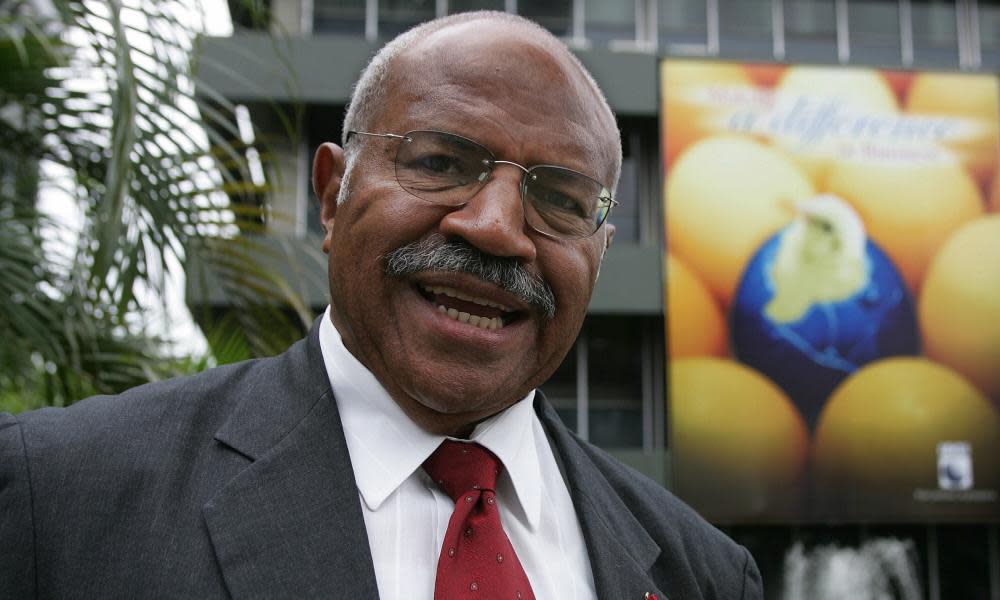Fiji politics in chaos after main opposition party suspended

The political situation in Fiji, yet to fully recover from the effects of the 2006 coup, is in a tailspin once again following the suspension of the main opposition party this week.
The suspension of the Social Democratic Liberal party (Sodelpa) by Fiji’s Registrar of Political Parties on Tuesday leaves parliament with just three opposition members (from the much smaller National Federation party) on the eve of a major national budget debate.
As the major indigenous Fijian party, Sodelpa won 39.85% of votes in the 2018 election and held 21 seats in the 51-member Parliament. The 2018 election was won by FijiFirst, led by Prime Minister Frank Bainimarama, which won just over 50% of the vote and 27 seats.
Related: Fijian military leader defends government's right to 'stifle' press during Covid crisis
Sodelpa is led by 1987 coup leader and former prime minister Sitiveni Rabuka, seen by some as the major rival of Bainimarama, who took power in the 2006 coup before forming government after the 2014 elections.
An influential regional player, Fiji is courted by both Australia and New Zealand to counteract China’s growing influence in the Pacific.
The troubled country has experienced four coups from 1987 to 2006, largely due to ethnic tensions and political differences between indigenous Fijians and Indo-Fijians, descendants of indentured labourers brought from India during colonial rule.
Indo-Fijians, who form 30% of Fiji’s 900,000 population, are mostly FijiFirst supporters while ethnic Fijians, at roughly 60% of the country, largely support Sodelpa.

Sodelpa has been suspended for 60 days after it was deemed to have breached the Political Parties Act, but it was riven by factionalism even before the ruling.
Rival factions within the party held separate meetings last weekend to elect two sets of officials for the same vacant positions. This was seen as a breach of rules on organising meetings and elections outlined in the party’s own constitution
Three days before the suspension, the party was humiliated by a leaked phone recording in which two party members appeared to make racist and misogynistic comments against fellow party members.
The party faces de-registration unless it resolves the issues within 60 days.
These developments are seen as a blow to the party, seen as the only serious challenger to Bainimarama’s ruling FijiFirst in the next election, , scheduled to be held in 2022.
Related: Fiji PM Bainimarama won't face assault charges over carpark tussle with MP
FijiFirst was formed by the Bainimarama-led interim military government to contest the 2014 election, which it won.
The divisions in Sodelpa have been attributed to deep-seated rivalries based on traditional and provincial differences and competing leadership ambitions.
Traditional confederacy rivalries that have been simmering for a while have come to the fore, with two powerful chiefs on opposing sides.
There are serious concerns in Fiji about the prospect of losing the a strong opposition in Fiji’s parliament and in the lead-up to the next election.
In a Facebook post, university professor and a former member of Fiji’s Electoral Commission, Vijay Naidu, said the suspension was an opportunity for the party to address their differences and move towards unity.
“Rather than any superficial plastering over of the differences that have caused the embarrassing public divisions in the party, the 60 days of suspension should be the time to thoroughly thrash out issues and move towards genuine unity,” said Naidu.
Sodelpa is an offshoot of the Soqosoqo Duavata ni Lewenivanua (SDL) party, formed by Fiji’s former prime minister, Laisenia Qarase, in 2013. Qarase, who died last month, was ousted in the Bainimarama-led coup.
Among other things, the Sodelpa rift shows that Rabuka, who reformed himself as a moderate to appeal across ethnic lines, is struggling to contain the radicals and party hot-heads.
One area of contention is over the appointment of Vijay Singh as the party’s first ever Indo-Fijian vice-president by one Sodelpa faction.
It reflects Fiji’s continuing struggle to overcome historical ethnic divides despite government’s avowed multiracial policies, including the elimination of a racially-based voting system and a common name - “Fijian” - for all citizens.
The big question now is whether Sodelpa can reconcile and regroup to recover in time for the 2022 elections. If not, it could be a walkover for FijiFirst.


